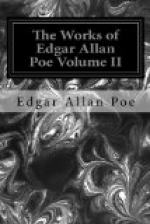FROM his cradle to his grave a gale of prosperity bore my friend Ellison along. Nor do I use the word prosperity in its mere worldly sense. I mean it as synonymous with happiness. The person of whom I speak seemed born for the purpose of foreshadowing the doctrines of Turgot, Price, Priestley, and Condorcet — of exemplifying by individual instance what has been deemed the chimera of the perfectionists. In the brief existence of Ellison I fancy that I have seen refuted the dogma, that in man’s very nature lies some hidden principle, the antagonist of bliss. An anxious examination of his career has given me to understand that in general, from the violation of a few simple laws of humanity arises the wretchedness of mankind — that as a species we have in our possession the as yet unwrought elements of content — and that, even now, in the present darkness and madness of all thought on the great question of the social condition, it is not impossible that man, the individual, under certain unusual and highly fortuitous conditions, may be happy.
With opinions such as these my young friend, too, was fully imbued, and thus it is worthy of observation that the uninterrupted enjoyment which distinguished his life was, in great measure, the result of preconcert. It is indeed evident that with less of the instinctive philosophy which, now and then, stands so well in the stead of experience, Mr. Ellison would have found himself precipitated, by the very extraordinary success of his life, into the common vortex of unhappiness which yawns for those of pre-eminent endowments. But it is by no means my object to pen an essay on happiness. The ideas of my friend may be summed up in a few words. He admitted but four elementary principles, or more strictly, conditions of bliss. That which he considered chief was (strange to say!) the simple and purely physical one of free exercise in the open air. “The health,” he said, “attainable by other means is scarcely worth the name.” He instanced the ecstasies of the fox-hunter, and pointed to the tillers of the earth, the only people who, as a class, can be fairly considered happier than others. His second condition was the love of woman. His third, and most difficult of realization, was the contempt of ambition. His fourth was an object of unceasing pursuit; and he held that, other things being equal, the extent of attainable happiness was in proportion to the spirituality of this object.
Ellison was remarkable in the continuous profusion of good gifts lavished upon him by fortune. In personal grace and beauty he exceeded all men. His intellect was of that order to which the acquisition of knowledge is less a labor than an intuition and a necessity. His family was one of the most illustrious of the empire. His bride was the loveliest and most devoted of women. His possessions had been always ample; but on the attainment of his majority, it was discovered that one of those extraordinary freaks of fate had been played in his behalf which startle the whole social world amid which they occur, and seldom fail radically to alter the moral constitution of those who are their objects.




